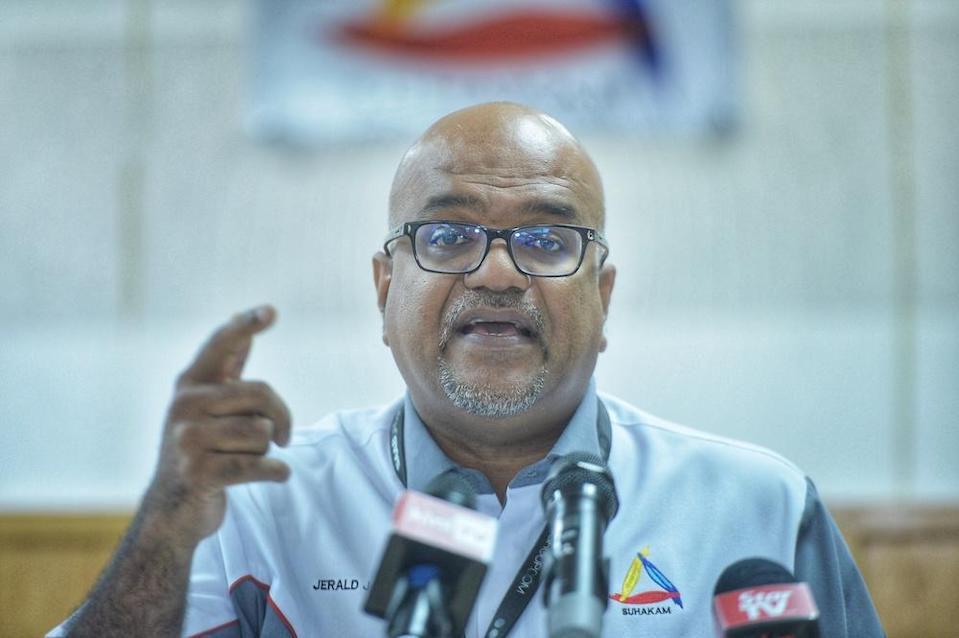
Jerald Joseph
KOTA KINABALU (Apr 19): Some politicians are using the ‘stateless’ issue as their political tool, said the Human Rights Commission of Malaysia (Suhakam).
Its commissioner, Jerald Joseph, said that Suhakam had conducted a meeting with various members of parliament and State legislative representatives from both the government and opposition.
“Suhakam accepts that challenges and difficulties of politicians, regardless of their party, whereby some are using this ‘stateless’ issue as their political tool,” he said at a press conference here on Tuesday.
Jerald added that the ‘statelessness’ issue in Sabah required a long-term solution.
“A lot of research has been done on the issue and Suhakam hopes the Federal and State governments can solve the problem,” he said.
Between 2017 and 2021, Suhakam Sabah had received a total of 2,144 complaints, out of which 1,036 were related to citizenship/statelessness, he said.
“The situation of statelessness in Sabah is the result of long years of mixed migration coupled with complex social, economic, geographic and political dilemmas in this region.
“According to data obtained by the Suhakam Sabah office, the number of complaints related to registration of official documentation including birth registration and identity card among various groups in Sabah for instance, indigenous peoples and children of migrants in Sabah, were viewed as serious as the number of complaints increased every year.
“For indigenous peoples in Sabah, the standard operating procedures (SOPs) for late birth registration and court proceedings are burdensome to villagers as most parents need to travel far to register their child’s birth; later affects their child’s access to other rights such as going to school and have access to health care et cetera,” he said.
Jerald added that among the recommendations by Suhakam to address the documentation issues include respecting the right of all children to have a nationality.
“A mechanism should be developed to address the problem of statelessness within the national borders and ensure that every child is registered at birth and is granted nationality,” he said.
Jerald added that Suhakam also recommended that in the matter of birth registration, an extension in the period of registration of births from the present 14 days to at least three months to assist, especially those living in remote areas; and that it should be mandatory that the Registration Department registers all applications for birth certificates, including late registration, without unnecessary delay.
He said that Suhakam also recommended that more campaigns be carried out to inform parents of the importance of registering the birth of their children, and that greater effort must be made to encourage parents of children born out of wedlock to register such births to prevent problems for the child when being enrolled for primary school.
“The Commission will be engaging the National Registration Department and the Ministry of Home Affairs to achieve an amicable solution to this long overdue problem which has hampered the fundamental rights to citizenship. The new government must exercise its political will to resolve the problem of many people, including children, on its soil,” Jerald said.
Suhakam also said that education should be made accessible to all, and thus, the country should revise its vision in giving education, he said.
At the same time, Jerald also commented on Suhakam’s working visit to Pulau Omadal in Semporna which is home to 451 people (and 56 houses) who were documented and 535 undocumented/stateless sea gypsies (and 88 houses).
“They depend entirely on rain for the supply of freshwater and solar for electricity. Suhakam observed that there are some prejudices in the relationship between the citizens and the stateless community in Pulau Omadal as the stateless community was accused of several misconducts such as prostitution and drug.
He added that Suhakam had held a discussion with non-governmental organisations (NGOs) in Semporna to further understand the on-ground issues faced by the communities.
“Statelessness/documentations is an ongoing issue in Semporna that has been presented for generations but still no apparent solution for it.
“In addition, there is no discussion between the communities and the policymakers.
“Furthermore, the SOP for late birth registration and court proceedings is burdensome to villagers as most parents need to travel far to register their children and later affects their children’s access to other rights such as going to school and having access to healthcare, among others,” he said.
Jerald said that based on the information gathered, Suhakam, together with the National Commission of Human Rights of Indonesia (Komnas HAM) and the Commission on Human Rights of the Philippines (CHRP) jointly recommended that the Malaysia, Indonesia and Philippines governments, should ensure the access of stateless persons to basic rights such as to food, livelihood and education, among others while their documents are being processed; and that the right of all children to have a nationality be upheld and that a mechanism should be developed to address the problem of statelessness within national borders and to ensure that every child is registered at birth and is granted with nationality.
He said that Suhakam, Komnas HAM and CHRP also recommended that the National Security Council of Malaysia to indefinitely sanction detention of stateless children in Sabah and look into alternatives to detention.
“Children alleged of immigration offences should be provided with an appropriate alternative placement through community based care,” he said.
He added for example, that there were children being detained at the ‘Rumah Merah’, also known as the Menggatal Detention Centre for immigration offences, for long duration.
“No children should be in detention facilities,” he said, adding that this goes against children’s rights.
